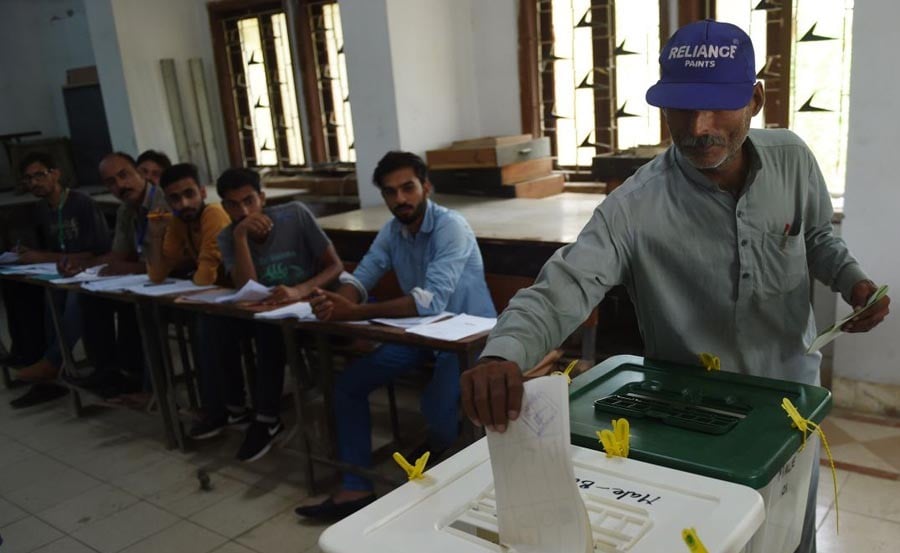
All major political parties now in opposition are claiming their polling agents across the country were not allowed to take part in the counting process. What do the polling agents have to say?

In the conduct of 2018 elections, there has been this deep-rooted distrust between the polling staff deputed by the Election Commission and the polling agents of political parties that would now form the opposition in the centre as well as in the province of Khyber Pukhtunkhwa and Punjab.
In this environment, even the legally authorised acts are perceived with doubts. At many polling stations, the presiding officers asked the polling agents to identify themselves and produce the copy of the authority letter issued to them by the Chief Polling Agent of their party. This may otherwise have been a legitimate query, it led to a ruckus that was settled only at the intervention of Chief Polling Agents.
"I had to personally intervene in the case of few polling agents who were disallowed from entering the polling stations because of identification issues," says Anjum Shehzad, Chief Polling Agent of Pakistan Muslim League-Nawaz’s (PML-N’s) candidate in NA-247 Karachi.
The distrust proved detrimental to the smooth running of the polling process. Many of the polling agents thought they would have to adopt a confrontational approach in dealing with the polling staff, including the military personnel, in order to secure their legal rights within the polling stations, "I had to personally intervene where our polling agents were too timid……I know how to confront the security people and polling staff," says another polling agent in Multan.
Both major political parties now in opposition, PML-N and PPP, are claiming their polling agents across the country were not allowed to take part in the counting process. Both the parties do not yet have a collated and centralised data to support their accusations.
PPP’s media cell in-charge in Islamabad, Nazeer Dhoki, says their party leader, Taj Haider, is compiling figures of "how many polling agents were denied entry into polling station at the time of counting and how many were not provided with Form 45". Dhoki says they have received complaints from all over the country about their polling agents not given Form 45, adding "we also received reports from Balochistan about our polling agents being physically thrown out of the polling station". He says his party had been advocating that rangers and military personnel should not be given magisterial power "but our entreaties fell on deaf ears".
Senator Mushahidullah Khan tells TNS that his party, the PML-N, "would be presenting these figures in the White Paper on rigging that it would soon make public".
Political parties face problems in compiling data as polling agents generally are not appointed by the central authority of the party. It’s the candidates themselves who appoint these agents and they get dispersed the moment electoral process is complete, with most of them not even in contact with the party organisation.
Most of the polling agents interviewed for this article tell TNS the polling went smoothly from 8am to 6pm. However, their confrontation with the polling staff and military personnel started after the commencement of counting.
Anjum Shehzad, a veteran political worker, has an experience of acting as a polling agent in all the parliamentary elections during the last 30 years. He thinks the confrontational approach is something central to achieving even their legal rights.
Shehzad did admit that of the 150 polling agents for NA-247, not all were properly trained and they left the polling stations soon after the process concluded, "But about 60 polling agents were asked to leave the polling stations as soon as counting start by the military personnel," he says.
In another constituency in Karachi, polling agent Faisal Chaudhry says he did participate in the counting process "but they didn’t give me Form 45. The presiding officer told me I had seen the counting and I will know about the result through the RTS system. I have no idea why they didn’t give me Form 45. However, during counting there was no evidence of rigging."
Hafeez Hameedullah a JUI candidate from Quetta city, tells TNS his party’s polling agents were "physically thrown out of the polling stations by military personnel deployed inside the stations". He was reluctant to give the names and identifications of his polling agents as "they are too afraid to talk to anyone including the media".
Musa Khan, polling agent for ANP candidate in PK-65 Pibi, was also reluctant to talk on telephone, until he said somebody from his party confirmed that the person on other side was a media person. "I was polling agent in Pibi government middle school for girls and boys. I was not allowed to participate in the counting process by the army hawaldar"
"I was there in the polling station from 8 till 6 in the evening. After which I was told by the army personnel that counting would take place without my presence and I can go now," he says.
Read also: Voicing dissent
Musa Khan has been an ANP activists for the past three decades and has served as polling agent in 1993, 2008, 2013 and now 2018 elections, "I am fully trained and aware of my role as a polling agent. I had to identify each voter through his ID documents and personally as well. I did that throughout the day on July 25. I’m not sure why they didn’t allow me to participate in the counting".
When asked if he thought there was some sort of rigging in his absence, he says he doesn’t know. Most of the polling agents, it appears, are afraid to talk to the media. One thing they are not sure about is why they were not allowed to take part in the counting process.
The names of all polling agents have been changed to protect privacy